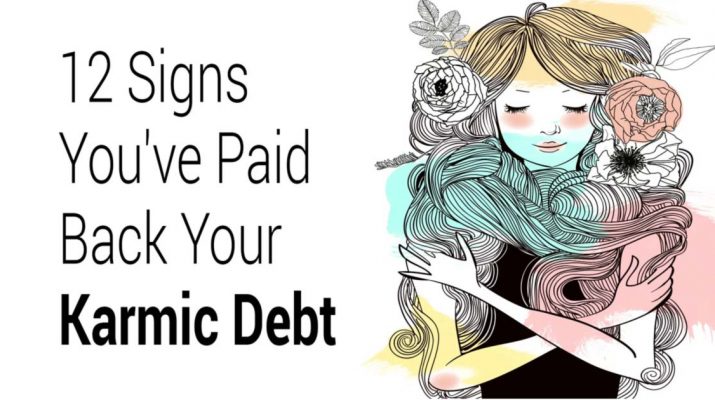Karma, in one form or another, is a consistent theme throughout most if not all of the world’s major spiritual traditions and religions.
In this article, we’re going to discuss karma, karmic debt, and twelve signs that you’ve paid back the latter.
What Is Karma?
By itself, the word karma simply means ‘action.’ The spiritual and the religious tend to associate karma with ‘the law of cause and effect,’ ‘reaping what you sow,’ ‘yin and yang,’ and so on. However, the second part of those sayings is the effect or accumulation of effects; or debt.
While two people of different religions, e.g., Buddhism and Christianity, may go back and forth on the technicalities, e.g., ‘hell vs. rebirth,’ the fundamental idea of karma is both espoused and accepted by followers of both. The same applies to those who follow Hinduism or Jainism.
Going beyond individualistic views of karma on a spiritual and religious level, the very texts themselves are imbued with karma; these include the primary texts of Buddhists and Christians. Here are some related passages from both:
Buddha (From The Bhayabherava Sutta):
“These beings who are ill-conducted in body, speech and mind, revilers of noble ones, wrong in their views, giving effect to wrong view in their actions, with the breakup of the body after death, have reappeared in the plane of misery, in a bad destination, in a lower worlds, even in hell.”
“”But these worthy beings who were well conducted in body, speech and mind, not revilers of noble ones, right in their views, giving effect to right view in their actions, on the breakup of the body after death, have been reborn in a good destination, even in the heavenly world.”
Jesus
(Mark 4:24):
“Then He said to them, “Take heed what you hear. With the same measure, you use, it will be measured to you; and to you who hear, more will be given.”
(Galatians 6:7):
“Be not deceived, God is not mocked: for whatsoever a man soweth, that shall he also reap.”
Notice the paradox between the Buddha’s words and those of Jesus.
Traditional Buddhists do not emphasize the soul’s descent into ‘hell’ or ascension into ‘heaven,’ yet the Buddha mentions both in the sutta. Meanwhile, Jesus mentions nothing about either heaven or hell when discussing the repercussions for one’s actions, or collective karma.,
In other passages not mentioned here, the Buddha likens the blooming or decrepitation of seeds when discussing karma and karmic debt. Who else analogizes seeds with karma and the repercussions thereof?
But that’s neither here nor there.
Clearing the debris from any philosophical differences, do any common underlying principles remain?
Yes, and these similarities are sufficiently and concisely explained in three words: ‘action and reaction.’
Every person, whether an atheist, agnostic, Christian, Buddhist, Jainism, Muslim, Scientologist, or Sun Worshiper, can plainly see the birth of action and reaction in everyday life. Press the gas pedal, the car moves; type on a keyboard, words appear; chew and swallow food, hunger dissipates.
All matters, large and small, are subject to action and reaction. This is the basic gist of karma and karmic debt.
Misconceptions About Karma
“As a physician, I teach karma from a scientific point of view, because what I love about karma is that it is rational. Karma is like the law of physics.”
~ Jan Chozen Bays (source)
While reincarnation may be a central tenet of Buddhism, Hinduism, and other religions, it is not necessary to believe in reincarnation to see the truth of karma and karmic action. Re-reading the New Testament should make this truth self-evident.
Remember, the law of cause and effect and karmic debt does not apply solely to that which takes place – or doesn’t take place – following physical death. The action and reaction is the focus here; not the consequences of such in the afterlife.
The implicit ignorance to always associate karma with physical death, and the consequences of such, is the most ubiquitous misconception about karma that exists. It also bears no relevance to the topic at hand.
Karmic Debt And 12 Signs You’Ve Paid It
If one accepts that actions carry consequences, it’s reasonable to assume that accumulation of the wrong actions can lead to a ‘negative balance’ (pun certainly intended) that must be ‘paid.’
While the remainder of this article may be a bit more philosophical in nature, you may identify with some of these ‘signs.’
Without further ado, here are 12 sights that you took care of that negative karmic account balance:
You Have A Deep Sense Of Gratitude
In the Hindu religion, taking for granted the complex processes that make life possible are considered rins, or karmic debts. These processes include things like sleep, sunlight, digestion, and growth.
Since, in the Hindu view, these processes necessitate the creation and maintenance of material and divine forces, tributes must be made to the latter.
Selfless work and gratitude for these things is a sign that this rin has been paid.
You Revere Your Ancestors
While modern life can certainly be challenging, it’s relatively well-going compared to the days of yore. Really, the fact that you’re alive, breathing, and reading these words on a digital screen is a testament to the resilience of our foremothers and forefathers.
In some religions, including Hinduism, holding a deep reverence for your ancestors is considered the paying off karmic debt.
You Hold The Sages In Deep Regards
Whether you consider the likes of Buddha, Jesus, Krishna, Mohammad, a big-eyed alien, or something else to be some spiritual teacher or God is of little consequence here. If you’ve become a better person – more loving, kind, and tolerant – from their teachings than you owe a debt.
Holding your Teacher in the highest respect should be considered the paying back of that debt.
You’Re Grateful To The Knowledge Bearers
Most of us are relatively healthy. The only reason that’s possible is because of those individuals who dedicated their lives studying and researching things like sanitation, immunization, dentistry, surgical techniques, and the like. We can also include those scientific and technological discoveries that have benefitted our lives.
We owe a tremendous debt to these people. So we pay it by honoring their dedication, ingenuity, and sacrifice.
You’Re ‘Off’ Autopilot
Most people walk about in a daze. They allow their minds to be pulled this way and that with little resistance. Such a state is similar to the autopilot mechanism that pilots use when they no longer require manual control of the aircraft.
Breaking the chains of emotion and thought for awareness is true freedom. It is also a sign that you may have paid back your karmic debt.
You Witness Synchronicities
Synchronicities are events that unfold which reflect your state of consciousness at the time. For example, the spiritual teacher Eckhart Tolle mentions in his book ‘The New Earth’ how he was close to running out of money while writing ‘The Power of Now.’ He bought a lottery ticket and won $1,000.
Positive synchronicities occur when a higher level of consciousness has been reached – a common occurrence following the repayment of karmic debt.
You Forgive Easier And More Willingly
It is human nature to hold onto grudges and inflict pain onto ourselves. It’s much more difficult to transcend this tendency and recognize that forgiveness – besides relieving us of this pain – is an incredibly powerful tool for spiritual development.
The ability to forgive someone no matter their transgressions is also a potential sign that you’ve paid back your karmic debt.
External Circumstances Matter Much Less
A vast majority of people seek their happiness from outside of themselves. This misguidedness can bring about a never-ending cycle of gain and loss, happiness, and unhappiness. Such an existence is what Buddhists refer to as samsara – a lifetime of suffering.
Breaking through this illusion is a necessity for advanced spiritual development. Only by recognizing that happiness is a product of our state of consciousness can we ever be truly and sustainably happy.
You Dedicate Yourself To Service
The ego would love for us to be concerned with just us. However, this is a spiritually poor way to live and a telltale sign of an underdeveloped spiritual core.
So then, the transcendence of ego to the realization that we are One is a huge indication that past bad karma has been repaid.
You Realize The Futility Of Materialism
Will mankind ever see through the illusion that is materialism? Who knows? Money and possessions still reign supreme in the eyes of the world. Fortunately, these things needn’t run your life.
When you become more conscious, you begin to realize the futile nature of ‘stuff’ and the accumulation of such. You may have paid back your karmic debt.
You Live In The Present
The past and the future are phantoms of the mind. In the case of the former, they’re memory traces; the latter, illusions. The present moment is life, not the illusory past or future.
Seeing this is a sure sign of a maturing spiritual core.
You Don’T Fear Death
Most of us walk around completely oblivious to what waits for us around the corner of death. It is this obliviousness that causes fear more than anything.
One of the greatest realizations is that we are more than our physical body; this shell. Knowing this allows us to live life fearlessly, love endlessly, and give generously.


